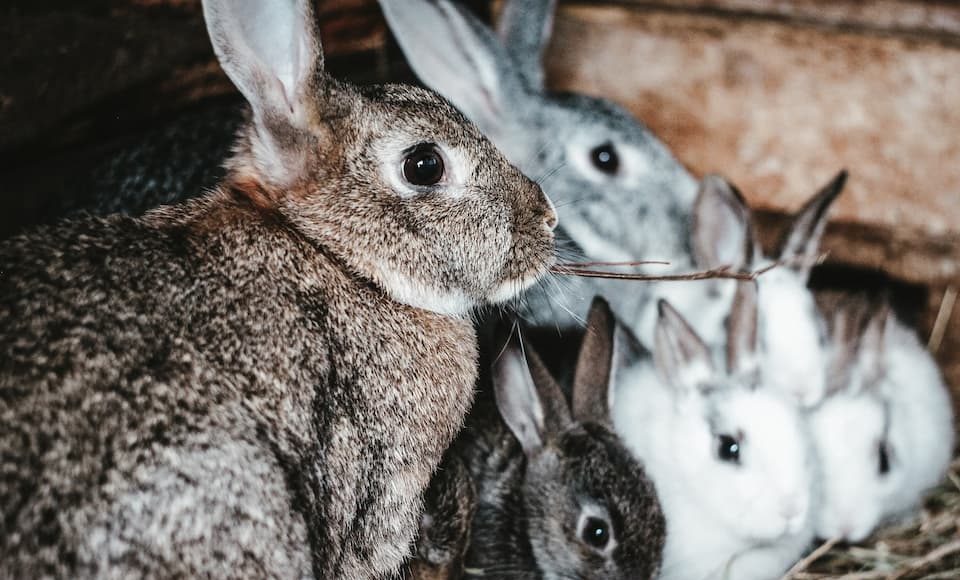Is It Too Late To Spay My Rabbit?
As a rabbit owner, you’re perhaps wondering, “Is it too late to spay my rabbit?” regardless of your female rabbit’s age, what matters most is that your rabbit gains all the benefits of spaying. In short, a female rabbit is considered too old to get spayed when they’re 5-6 years old, although there are lots to take into consideration. Keep reading to find out more!
When Should A Rabbit Be Spayed Or Neutered?
In regards to a male rabbit, the best time for them to be neutered is between 3 and 5 months old, while female rabbits are generally old enough to be spayed between 4 and 6 months. When both male and female rabbits have reached the age of 5-6 years old, they are generally considered too old to be altered. A rabbit that’s too young or too old can be at higher risk for complications from surgery.
When possible, it’s always recommended to spay or neuter your rabbit before any health concerns or problem behaviors arise. That’s why it’s best to ensure this by getting the surgeries completed when your rabbit is still young. Technically, when a female reaches sexual maturity or a male’s testicles have descended (normally between 3 and 6 months of age), they can safely undergo the procedure. It also depends on your rabbit’s size, breed, and current health; however, a vet may feel that it’s best to wait until your rabbit is a little bit older.
What about rabbits that are older? Rabbits are just like humans. As an animal ages, anaesthesia becomes inherently riskier. While opinions vary, most exotic vets agree that the benefits of the procedure often exceed the risks, even for older adult rabbits. Something else to take into consideration is that an older rabbit will need more extensive pre-surgical screening and could take longer to recover. So, if your rabbit has already reached their senior years (5 – 6+ years old), then you’ll need to have a serious heart-to-heart with your vet about whether the procedure is safe for your rabbit, and whether or not the surgery would still provide all of the intended benefits (increased longevity, decreased aggression/spraying/humping, etc).
Are There Any Adverse Side Effects From Getting A Rabbit Spayed?
The vast majority of rabbits generally won’t experience any adverse effects following spaying. However, there are many myths and beliefs about spaying that are not supported by hard facts or research. One example, is that your rabbit will become fat and lazy, which isn’t the case. Again, make sure to discuss the pros and cons or any concerns you may have with a vet familiar with rabbits.
What Are The Main Benefits Of Getting My Rabbit Spayed?
There are lots of health and behavioral benefits that come from spaying a rabbit:
- Getting a rabbit spayed eliminates unwanted pregnancies. While the thought of raising baby rabbits may be a wonderful family experience, finding homes for the new rabbits would defiantly prove more challenging than one would expect. A single female can produce upwards of 14 baby rabbits with every litter, and it’s possible for her to have a litter every month – up to 168 rabbits per year!
- Spaying significantly reduces the risk of a female rabbit suffering from ovarian, uterine, and mammary cancers. Reproductive cancers are quite common in rabbits.
- A rabbit that’s spayed is much less likely to display undesirable hormone-induced behaviors such as mounting, urine spraying (or territorial marking), and aggression.
- Litter box habits can become more predictable when a rabbit is spayed.
- Rabbits can become calmer and easier to handle.
- Spaying prevents a common condition that many female rabbits can experience called “pseudo-pregnancy”, also known as a false pregnancy, where they will start nest building, produce milk, and experience maternal aggression towards people and other animals.
Is The Procedure Safe?
Years ago, rabbit surgery was considered being high-risk, and many vets were reluctant to perform any planned surgery on rabbits. The good news is that nowadays there’re far safer anaesthetics available, anaesthetic techniques have since advanced enormously and veterinary training is more available, so rabbit neutering operations are a lot safer.
What Happens After The Procedure?
The majority of rabbits do very well after surgery and heal without incident, although it’s still incredibly important to watch them closely, monitor their incisions and make sure that they’re eating.
Because rabbits are prey species, this means that they are hardwired to hide any signs of illness or pain, so it’s the owner’s responsibility as a dedicated pet parent to provide them with a safe, comfortable environment and to carefully observe them as they heal. Watch for any signs, regardless of how subtle they may seem, that could indicate that your rabbit needs additional support i.e. decreased appetite, decreased water intake, abnormal faecal output, behavior changes.
Due to females undergoing a more extensive procedure, they may want to be left alone and do not cherish the thought of being handled or moved around for a few days afterwards. Other than making sure your rabbit has access to lots of fresh grass-hay and fresh water, and administering their daily prescriptions or suggested supplemental diet, it’s normally best to respect their wishes of being in solitude for a while. If you start to notice your recently spayed rabbit licking, chewing, or scratching at its incision, you should contact your vet for suggestions on how to limit this behavior. Medication used to control pain is essential, so make sure they’re receiving the full amount of what they’ve been prescribed by your vet.
It’s also important to note that spaying mightn’t be an instantaneous fix, especially if the procedure is being done to address problem behaviors. Hormone levels can sometimes take some time to stabilize, so less-than-desirable behavior patterns could continue for a few weeks to a couple of months after the procedure.
While spaying a rabbit isn’t the key to eternal life, it has statistically been proven to significantly increase the overall health and longevity of a rabbit. These procedures can also often have the added benefit of making a rabbit more affectionate and reducing problem behaviors.








